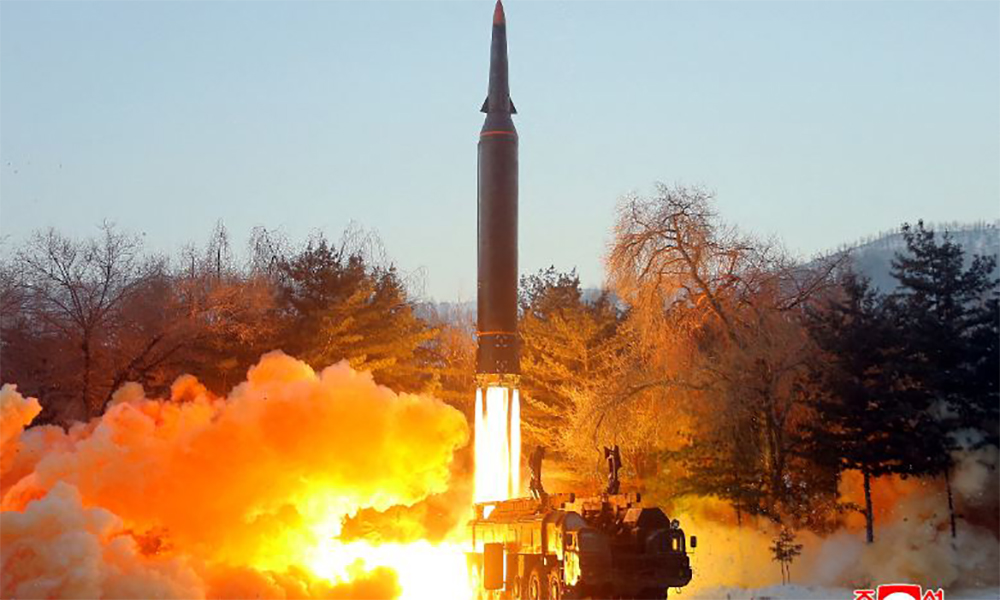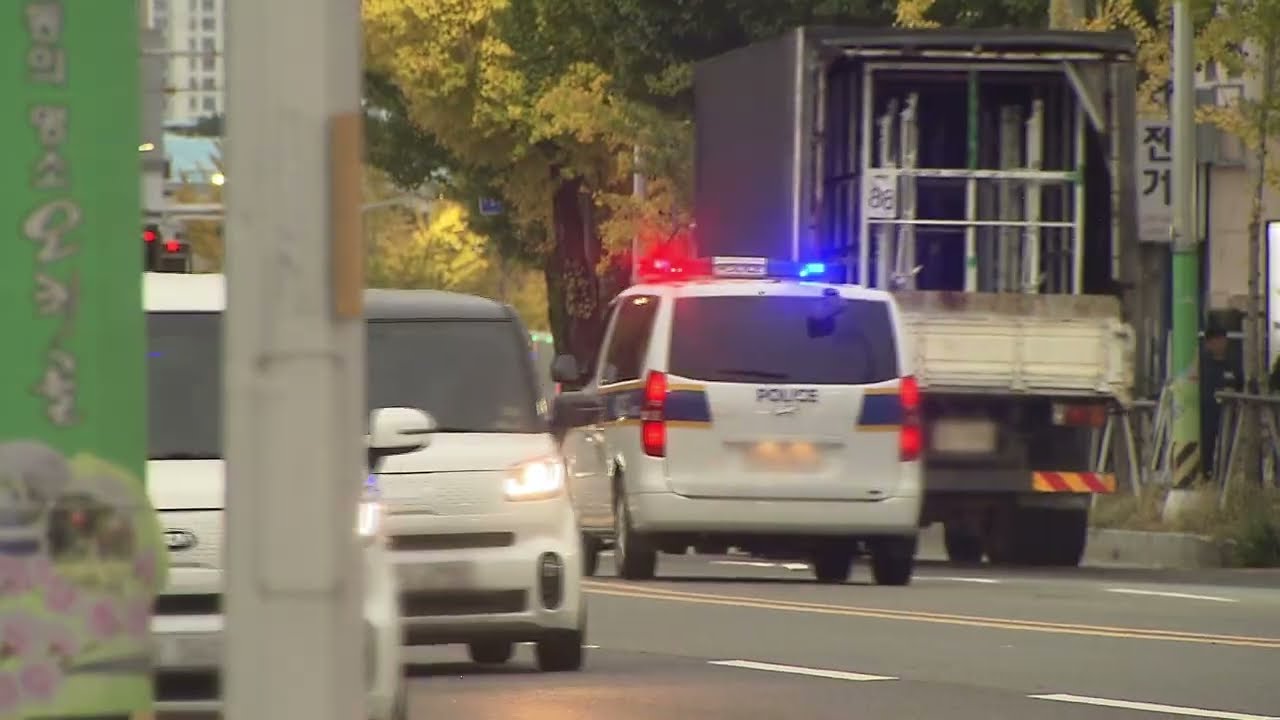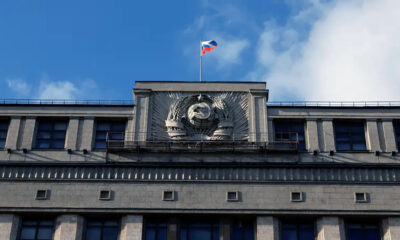Science & Technology
North Korea launches second hypersonic missile in fiery test

North Korea fired a "hypersonic missile" this week that successfully hit a target, state news agency KCNA reported on Thursday, its second such test as the country pursues new military capabilities amid stalled denuclearisation talks, Reuters reported.
The launch on Wednesday was the first by North Korea since October and was detected by several militaries in the region, drawing criticism from governments in the United States, South Korea, and Japan.
According to the report North Korea first tested a hypersonic missile in September, joining a race headed by major military powers to deploy the advanced weapons system.
Hypersonic weapons usually fly towards targets at lower altitudes than ballistic missiles and can achieve more than five times the speed of sound - or about 6,200 km per hour (3,850 mph).
Despite their name, analysts say the main feature of hypersonic weapons is not speed - which can sometimes be matched or exceeded by traditional ballistic missile warheads - but their manoeuvrability.
In Wednesday's test, the "hypersonic gliding warhead" detached from its rocket booster and manoeuvred 120 km (75 miles) laterally before it "precisely hit" a target 700 km (430 miles) away, KCNA reported.
The missile demonstrated its ability to combine "multi-step glide jump flight and strong lateral manoeuvring," KCNA said.
The test also confirmed components such as flight control and its ability to operate in the winter, KCNA added.
"The successive successes in the test launches in the hypersonic missile sector have strategic significance in that they hasten a task for modernizing strategic armed force of the state," the KCNA report said.
While it has not tested nuclear bombs or long-range intercontinental ballistic missiles (ICBMs) since 2017, in recent years North Korea has developed and launched a range of more manoeuvrable missiles and warheads likely aimed at being able to overcome missile defences like those wielded by South Korea and the United States, analysts have said.
"My impression is that the North Koreans have identified hypersonic gliders as a potentially useful qualitative means to cope with missile defence," said Ankit Panda, a senior fellow at the U.S.-based Carnegie Endowment for International Peace.
NEW MISSILE
Hypersonic weapons are considered the next generation of arms that aim to rob adversaries of reaction time and traditional defeat mechanisms, read the report.
Last month the United States completed construction of a massive, $1.5 billion long-range radar for a homeland missile defence system in Alaska that it says can track ballistic missiles as well as hypersonic weapons from countries such as North Korea, Reuters reported.
Photos of the missile used in Wednesday's test show what analysts said is a liquid-fueled ballistic missile with a conical-shaped Manoeuvrable Reentry Vehicle (MaRV) blasting off from a wheeled launch vehicle in a cloud of flame and smoke.
It is a different version than the weapon tested last year, and was first unveiled at a defence exhibition in Pyongyang in October, Panda said.
"They likely set up at least two separate development programmes," he added. "One of these was the Hwasong-8, which was tested in September. This missile, which shares a few features in common with the Hwasong-8, is another."
In a call with Japanese Foreign Minister Yoshimasa Hayashi on Thursday, U.S. Secretary of State Antony Blinken condemned the North Korea missile launch and discussed cooperation to achieve complete denuclearization and lasting peace on the Korean Peninsula, the U.S. State Department said in a statement.
"We take any new capability seriously, and as we've said, we condemn (North Korea's) continued testing of ballistic missiles, which are destabilizing to the region and to the international community," a State Department spokesperson said later.
According to Reuters talks aimed at persuading North Korea to surrender its nuclear weapons and ballistic missile arsenal have been stalled since a series of summits between leader Kim Jong Un and then-U.S. President Donald Trump broke down with no agreement.
U.S. President Joe Biden's administration has said it is open to talking to North Korea, but Pyongyang has said American overtures are empty rhetoric without more substantive changes to "hostile policies" such as military drills and sanctions, read the report.
The latest test came just hours before South Korean President Moon Jae-in attended a groundbreaking ceremony for a rail line he hopes will eventually connect the divided Korean peninsula, casting doubts over his hopes for an eleventh-hour diplomatic breakthrough with North Korea before his five-year term ends in May.
Science & Technology
Australia’s under-16 social media ban sparks anger and relief

Australians reacted on Friday with a mixture of anger and relief to a social media ban on children under 16 that the government says is world-leading, but which tech giants like TikTok argue could push young people to "darker corners of the internet".
Australia approved the social media ban for children late on Thursday after an emotive debate that has gripped the nation, setting a benchmark for jurisdictions around the world with one of the toughest regulations targeting Big Tech, Reuters reported.
The law forces tech giants from Instagram and Facebook owner Meta Platforms to TikTok to stop minors from logging in or face fines of up to A$49.5 million ($32 million). A trial of enforcement methods will start in January, with the ban to take effect in a year.
"Platforms now have a social responsibility to ensure the safety of our kids is a priority for them," Australian Prime Minister Anthony Albanese said on Friday
"We're making sure that mums and dads can have that different conversation today and in future days."
Announcing the details of the ban earlier this month, Albanese cited the risks to physical and mental health of children from excessive social media use, in particular the risks to girls from harmful depictions of body image, and misogynist content aimed at boys.
In Sydney on Friday, reaction to the ban was mixed.
"I think that's a great idea, because I found that the social media for kids (is) not really appropriate, sometimes they can look at something they shouldn't," said Sydney resident Francesca Sambas.
Others were more scathing.
"I'm feeling very angry, I feel that this government has taken democracy and thrown it out the window," said 58-year-old Shon Klose.
"How could they possibly make up these rules and these laws and push it upon the people?"
Children, meanwhile, said they would try to find a way around the ban.
"I feel like I still will use it, just secretly get in," said 11-year-old Emma Wakefield.
WORLD FIRST
Countries including France and some U.S. states have passed laws to restrict access for minors without a parent's permission, but the Australian ban is absolute. A full under-14s ban in Florida is being challenged in court on free speech grounds.
Albanese's Labor party won crucial support from the opposition conservatives for the bill that was fast-tracked through the country's parliament as part of 31 bills pushed through in a chaotic final day of parliament for the year.
The government has said enough notice was given as it first flagged the ban after a parliamentary inquiry earlier this year that heard testimony from parents of children who had self-harmed due to cyber bullying.
But it was criticised by social media firms and some lawmakers who say the bill has lacked proper scrutiny.
A spokesperson for TikTok, which is hugely popular with teen users, said on Friday the process had been rushed and risked putting children into greater danger.
"We're disappointed the Australian government has ignored the advice of the many mental health, online safety, and youth advocacy experts who have strongly opposed the ban," the spokesperson said.
Albanese said on Friday passing the bill before the age verification trial has been completed was the correct approach.
"We've got your back is our message to Australian parents," Albanese said.
"We don't argue that its implementation will be perfect, just like the alcohol ban for under 18s doesn't mean that someone under 18 never has access, but we know that it's the right thing to do."
The ban could strain Australia's relationship with key ally the United States, where X owner Elon Musk, a central figure in the administration of president-elect Donald Trump, said in a post this month it seemed a "backdoor way to control access to the Internet by all Australians".
It also builds on an existing mood of antagonism between Australia and mostly US-domiciled tech giants. Australia was the first country to make social media platforms pay media outlets royalties for sharing their content and now plans to threaten them with fines for failing to stamp out scams.
Science & Technology
South Korea authorities launch probe after three die in Hyundai car test
The Ulsan plant is Hyundai’s biggest manufacturing facility, with its own port and an annual production capacity of 1.4 million vehicles

South Korean authorities launched an investigation on Tuesday after three people died during a car test at a Hyundai Motor plant in the city of Ulsan, police told Reuters.
The two Hyundai researchers and one Hyundai contractor were found unconscious in a car at around 3:00 p.m. while they were testing it in a "chamber," according to Hyundai's labour union.
South Korean media reports said the three had suffocated.
A police officer in Ulsan said the police and the labour ministry were investigating the incident, including its cause.
A fire department official told Reuters that it first received a report at 3:17 pm that the accident happened at Hyundai's No.4 factory.
"Hyundai Motor Company is deeply saddened by the incident that occurred at our plant in Ulsan, South Korea," Hyundai said in a statement, saying it would "cooperate fully with all relevant authorities to determine the cause of this incident."
The Ulsan plant is Hyundai's biggest manufacturing facility, with its own port and an annual production capacity of 1.4 million vehicles, including exports of 1.1 million units.
In November last year, Hyundai Motor broke ground on a 2 trillion won ($1.44 billion) plant in Ulsan dedicated to making electric vehicles in South Korea, as the automaker accelerated a shift away from petrol-powered cars.
[embed]https://youtu.be/KrLKCrpLALU[/embed]
Science & Technology
Russia fines Google more than the world’s total GDP over YouTube bans

Russia has fined Google $2.5 decillion after the US tech giant took action against pro-Kremlin TV channels on YouTube following Moscow’s invasion of Ukraine.
Russia imposed a daily fine four years ago - a fine that has since swelled to an unprecedented level - ($20,000,000,000,000,000,000,000,000,000,000,000 - a 33-digit figure).
To put this into perspective, global GDP reaches an estimated $110 thousand billion (12-digit figure), according to the IMF.
Speaking to Russia’s TASS news agency, one expert, Roman Yankovsky from the HSE Institute of Education, said Google “clearly will not pay this penalty, and the Russian Federation will not be able to recover this money from the company."
Euronews reported that a short calculation shows that he is right.
Google's holding company, Alphabet, has a market capitalisation of slightly more than $2 trillion. Even with earnings of $80.54 billion from the last quarter, the tech giant doesn’t seem to be able to afford to pay the fine.
Google first barred pro-Moscow channel Tsargrad TV, which is owned by oligarch Konstantin Malofeev, four years ago.
At the time, Google was fined a daily penalty of 100,000 roubles and warned that amount would double every 24 hours if it went unpaid.
The original fine has been compounded by further penalties after Google eventually blocked a total of 17 Russian TV channels as a result of international sanctions, The Telegraph reported.
The tech giant now owes a staggering $2.5 decillion.
-

 Latest News4 days ago
Latest News4 days agoAfghanistan seals T20I series victory over Zimbabwe
-

 World4 days ago
World4 days agoSyrian clerics in former Assad stronghold call for national unity, democracy
-

 Latest News5 days ago
Latest News5 days agoDAB has collected over 7 billion Afghanis in worn-out banknotes over past year
-

 Latest News4 days ago
Latest News4 days agoU.S. sentences Afghan man to 30 years in prison for narco-terrorism and witness tampering
-

 International Sports3 days ago
International Sports3 days agoMessi vs Ronaldo: A look at their market values over the years
-

 Latest News4 days ago
Latest News4 days agoInvestment in Afghanistan’s pharmaceutical sector reaches $300 million: Union
-

 Latest News4 days ago
Latest News4 days agoChinese, Tajik officials discuss Afghanistan
-

 Sport4 days ago
Sport4 days agoAfghanistan’s Gulbaddin Naib fined 15% of match fee for dissent
























